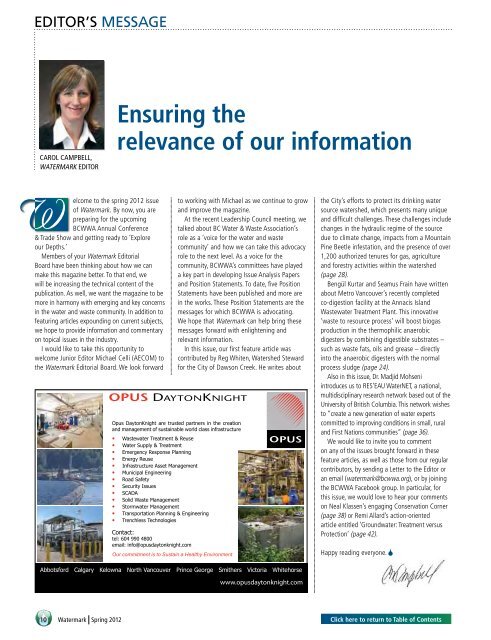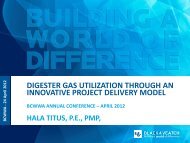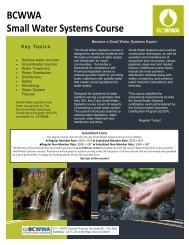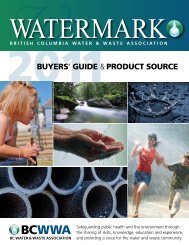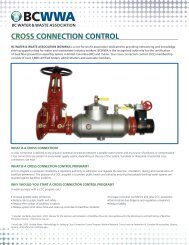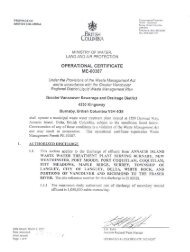Download - BC Water & Waste Association
Download - BC Water & Waste Association
Download - BC Water & Waste Association
You also want an ePaper? Increase the reach of your titles
YUMPU automatically turns print PDFs into web optimized ePapers that Google loves.
EdITOR’S MESSAGE<br />
CAROL CAMPBELL,<br />
WATERMARK EDITOR<br />
W<br />
elcome to the spring 2012 issue<br />
of <strong>Water</strong>mark. By now, you are<br />
preparing for the upcoming<br />
<strong>BC</strong>WWA Annual Conference<br />
& Trade Show and getting ready to ‘Explore<br />
our Depths.’<br />
Members of your <strong>Water</strong>mark Editorial<br />
Board have been thinking about how we can<br />
make this magazine better. To that end, we<br />
will be increasing the technical content of the<br />
publication. As well, we want the magazine to be<br />
more in harmony with emerging and key concerns<br />
in the water and waste community. In addition to<br />
featuring articles expounding on current subjects,<br />
we hope to provide information and commentary<br />
on topical issues in the industry.<br />
I would like to take this opportunity to<br />
welcome Junior Editor Michael Celli (AECOM) to<br />
the <strong>Water</strong>mark Editorial Board. We look forward<br />
ensuring the<br />
relevance of our information<br />
to working with Michael as we continue to grow<br />
and improve the magazine.<br />
At the recent Leadership Council meeting, we<br />
talked about <strong>BC</strong> <strong>Water</strong> & <strong>Waste</strong> <strong>Association</strong>’s<br />
role as a ‘voice for the water and waste<br />
community’ and how we can take this advocacy<br />
role to the next level. As a voice for the<br />
community, <strong>BC</strong>WWA’s committees have played<br />
a key part in developing Issue Analysis Papers<br />
and Position Statements. To date, five Position<br />
Statements have been published and more are<br />
in the works. These Position Statements are the<br />
messages for which <strong>BC</strong>WWA is advocating.<br />
We hope that <strong>Water</strong>mark can help bring these<br />
messages forward with enlightening and<br />
relevant information.<br />
In this issue, our first feature article was<br />
contributed by Reg Whiten, <strong>Water</strong>shed Steward<br />
for the City of Dawson Creek. He writes about<br />
Opus DaytonKnight are trusted partners in the creation<br />
and management of sustainable world class infrastructure<br />
• <strong>Waste</strong>water Treatment & Reuse<br />
• <strong>Water</strong> Supply & Treatment<br />
• Emergency Response Planning<br />
• Energy Reuse<br />
• Infrastructure Asset Management<br />
• Municipal Engineering<br />
• Road Safety<br />
• Security Issues<br />
• SCADA<br />
• Solid <strong>Waste</strong> Management<br />
• Stormwater Management<br />
• Transportation Planning & Engineering<br />
• Trenchless Technologies<br />
Abbotsford Calgary Kelowna North Vancouver Prince George Smithers Victoria Whitehorse<br />
10<br />
<strong>Water</strong>mark Spring 2012<br />
Contact:<br />
tel: 604 990 4800<br />
email: info@opusdaytonknight.com<br />
Our commitment is to Sustain a Healthy Environment<br />
www.opusdaytonknight.com<br />
the City’s efforts to protect its drinking water<br />
source watershed, which presents many unique<br />
and difficult challenges. These challenges include<br />
changes in the hydraulic regime of the source<br />
due to climate change, impacts from a Mountain<br />
Pine Beetle infestation, and the presence of over<br />
1,200 authorized tenures for gas, agriculture<br />
and forestry activities within the watershed<br />
(page 28).<br />
Bengül Kurtar and Seamus Frain have written<br />
about Metro Vancouver’s recently completed<br />
co-digestion facility at the Annacis Island<br />
<strong>Waste</strong>water Treatment Plant. This innovative<br />
‘waste to resource process’ will boost biogas<br />
production in the thermophilic anaerobic<br />
digesters by combining digestible substrates –<br />
such as waste fats, oils and grease – directly<br />
into the anaerobic digesters with the normal<br />
process sludge (page 24).<br />
Also in this issue, Dr. Madjid Mohseni<br />
introduces us to RES’EAU <strong>Water</strong>NET, a national,<br />
multidisciplinary research network based out of the<br />
University of British Columbia. This network wishes<br />
to “create a new generation of water experts<br />
committed to improving conditions in small, rural<br />
and First Nations communities” (page 36).<br />
We would like to invite you to comment<br />
on any of the issues brought forward in these<br />
feature articles, as well as those from our regular<br />
contributors, by sending a Letter to the Editor or<br />
an email (watermark@bcwwa.org), or by joining<br />
the <strong>BC</strong>WWA Facebook group. In particular, for<br />
this issue, we would love to hear your comments<br />
on Neal Klassen’s engaging Conservation Corner<br />
(page 38) or Remi Allard’s action-oriented<br />
article entitled ‘Groundwater: Treatment versus<br />
Protection’ (page 42).<br />
Happy reading everyone.<br />
click here to return to table of contents


